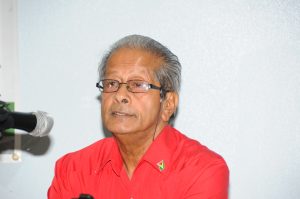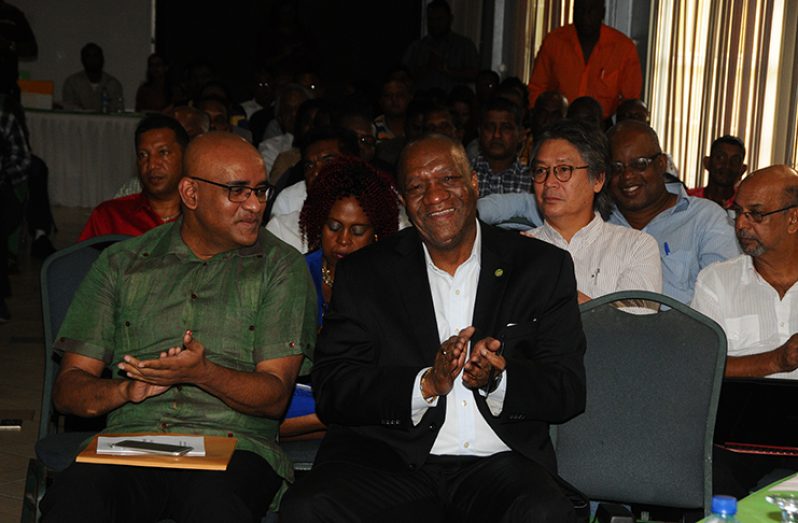– but differ on way forward
MINISTER of State Joseph Harmon has defended the government’s push to reform the ailing sugar industry, contending that despite challenges, the administration has a clear vision on returning the industry to a sound footing.
Speaking at a Guyana Agricultural and General Workers Union (GAWU) and UNIFOR conference titled “Sugar too big to fail” held at the Grand Coastal Hotel on Tuesday, the minister of state said that the government’s plan was crafted after discussions with stakeholders and a Commission of Inquiry (CoI) into the industry.
The theme of the conference was exploited by the speakers, particularly President of GAWU Komal Chand and Leader of the Opposition Bharrat Jagdeo, both of whom contended that government’s actions were not the best.
Harmon, however, defended the government’s position, noting that after the APNU/AFC Government was elected to office in 2015, it found that GuySuCo had a debt of $82 billon.
“These realities [that] we met led to us deciding that we will have to take a closer look at the national institution and the largest employer in Guyana… we also agreed that there had to be careful consideration and policy, to ensure the survival of the industry and its return to viability,” said the minister of state, who added that the most prudent action at that time was to conduct a CoI into the sugar industry.
The CoI which lasted for a month recommended that the corporation is privatised within three years; that there should be a serious evaluation of diversification options which would allay reliance on sugar for revenues; the amalgamation of the Wales and Uitvlugt estates and the assignment of workers to the Uitvlugt factory which was operating at 50 per cent, among other things.
The findings of the CoI were shared with GAWU and other stakeholders who contributed to the formulation of a plan of action.
“The plan was aggressively interrogated by the Cabinet and the document was sent out… it became the basis of the government’s position,” said Harmon, adding that the report was circulated to unions and the political opposition.
The minister contended that there were consultations at every stage of the process and decisions taken were transparent.
“Whatever shape or form, there must consultations because it is the bedrock of what we do…. If we are to advance operation we must put the issues on the table… we cannot await conferences or put our issues in letters to the editor,” said the minister of state.
BEST INTEREST

The government, he said, has been forthcoming with their decisions regarding the industry and will continue to work in the best interest of the sugar industry.
Harmon said the government does not take the industry lightly and intends on ensuring it has a clear vision on the future.
“We need a more compact sugar industry… so far there is distinct clarity on the way the government is dealing with the industry,” said the minister.
Opposition Leader Bharat Jagdeo, however, contended that the restructuring of the industry was not properly thought out.
Although he said the opposition is not opposed to reform, he said that decisions should be based on studies, particularly a social impact and economic studies.
“The restructuring should be based on theoretical and not political basis,” said Jagdeo, reiterating that the restructuring of the industry should be grounded on the basis of studies.
GAWU also believes that in recent times some persons have sought to downplay its importance and to confine its role merely within the ambit of profit and loss.
“On the other hand, the GAWU contends that we cannot ignore the widely known fact that any examination of the industry cannot be confined to such a narrow outlook. Sugar has transcended mere finance and has become a social institution in our society. Some have argued that this should not be the case but the reality is that its importance stretches beyond a black-and-white notion of profitability,” said Chand.
DISCOMFORT
He believes that many of the workers, who have been placed on the breadline, remain unable to find steady jobs and, in some cases, any job at all.
“Today, the hopes nurtured from such talk as ‘sugar will never die’ or ‘we will fix sugar’ heard boisterously during the 2015 elections campaign, have been dashed. It is most upsetting that this approach had been taken, especially, recognising that it was not necessary in the first place and that there were very good and real possibilities to overcome the difficulties in the sugar industry,” said the GAWU president.
History and future generations of Guyanese will condemn harshly those who advanced, approved and implemented the plans which affected so many ordinary people.
“The times, though difficult and distressing, must not daunt us, but, indeed, impel us to more determined activities. We of the GAWU pledge to continue to represent the workers’ cause, to bring greater attention to the workers plight and to press for effective support and solidarity for their cause.”
GAWU is clear, he said, adding that it wants the industry to succeed as a large number of Guyanese depend on its operations. Success must involve a collaborative and comprehensive approach.
Chan said there is no singular magic bullet but hard work, commitment, knowledgeable personnel and, of course, a motivated workforce, to return the industry to a firm footing.




.png)









